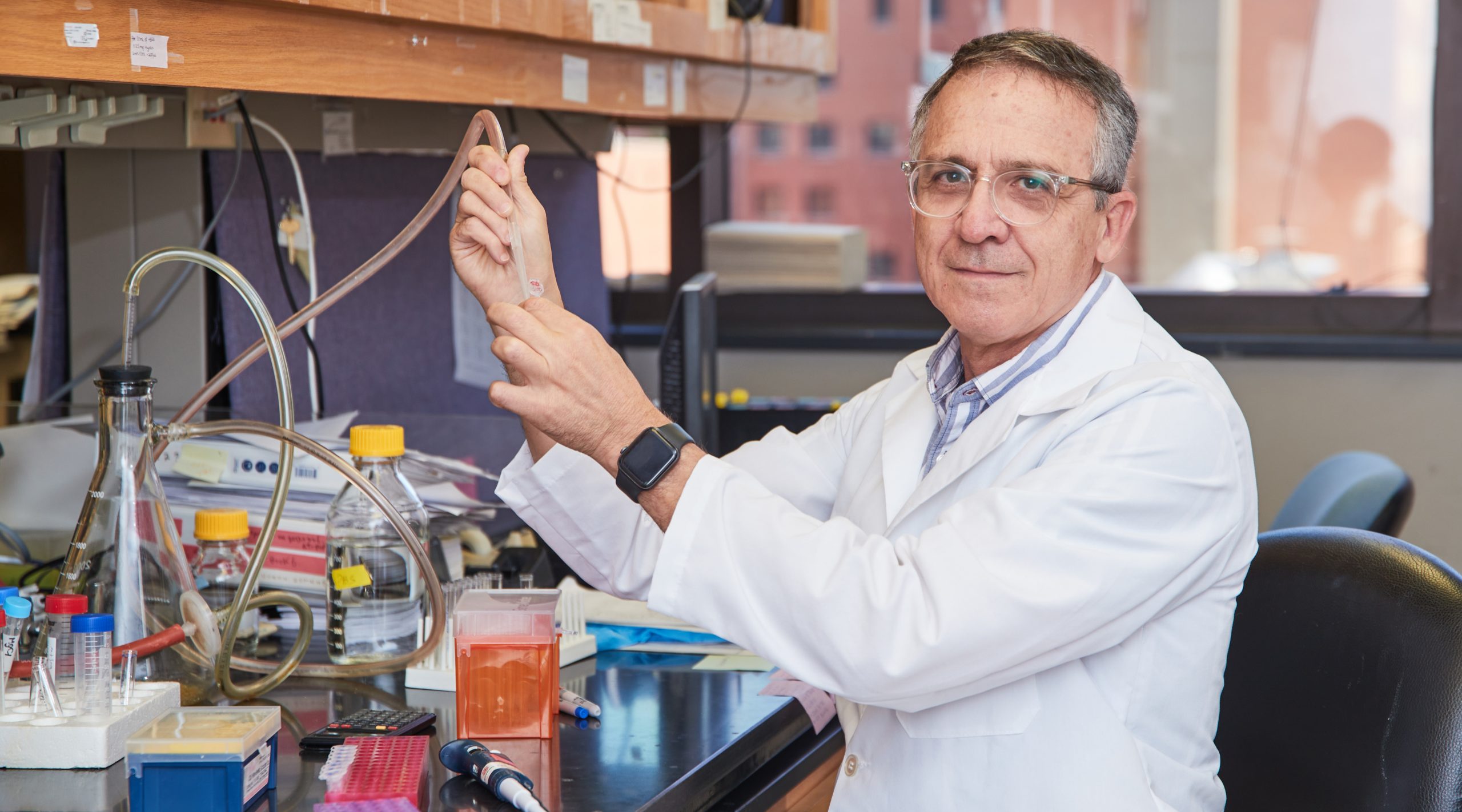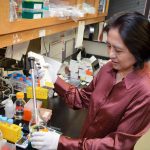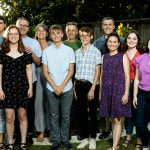José Alberola-Ila, M.D., Ph.D.
Professor Emeritus
Arthritis & Clinical Immunology Research Program
My 101
In my lab, we study how the immune system develops normally. In particular, we focus on T cells and how they function within the immune system. T cells are formed in the thymus and help protect the body against infection and disease. For the immune system to function properly, T cells must recognize you but not react against you or your tissues. So, the thymus serves as a sort of university where T cells learn how they should function in the body.
Using mouse models, we modify T cells and observe what molecules and proteins are important in the immune system’s function. By blocking the development of T cells or altering other factors associated with them, we can make changes in the way the cells respond to one another. From what we observe, we hope to learn how T cells control the immune response and develop new methods for dealing with disease.
Research
The research in my laboratory is focused in understanding the molecular mechanisms that regulate cell fate determination during immune cell development. We use mouse models to genetically alter pathways of interest and to analyze their impact on the development and function of different lymphoid cell types. Currently we are studying two different cell types with innate characteristics, iNKTs and ILCs.
Invariant natural killer T cells (NKT cells) are a conserved T cell population that behaves like innate cells, rapidly secreting cytokines when stimulated. Different subsets of iNKT cells have been reported, including NKT1, NKT2 and NKT17 cells, similar to TH1, TH2 and TH17 cells. The relationships between the different subsets, their stability, and their functional relevance remain incompletely characterized. We have shown in a mouse model (ET-2) that a small alteration in E protein activity during development results in a dramatic change in the differentiation profile of iNKTs, with a decrease in NKT1s and an increase in other subsets, including a novel type. This model provides a unique opportunity to test the impact of different NKT populations in normal immune responses. We are testing the impact of these changes in NKT cells on the immune response to flu, given the relevance of flu as a public health problem and the fact that activation of NKT cells has been successfully used as a novel adjuvant to increase vaccination efficiency.
Innate lymphoid cells (ILCs) are recently identified specialized cell subsets that play critical roles in rapid responses to pathogens, and share developmental and effector programs with conventional helper T cells. The distribution of effector subsets within these populations has important implications to the immune responses of an organism, and, therefore, the molecular mechanisms that determine the representation of each effector type within a population is a critical area of research to open new approaches to manipulation of these populations for clinical purposes. We are analyzing the role of a family of transcription factors called E proteins in the develpoment of different ILC susbsets using mouse models.
Brief CV
Education
M.D., University of Valencia (Spain), 1987
Ph.D., University Central, Barcelona (Spain), 1992
Honors and Awards
1988 Medical Degree’s “Extraordinary Award,” University of Valencia
1991 Visiting research fellow (EMBO short-term fellowship) at the Lymphocyte Activation Laboratory (Dr. D.A. Cantrell), Imperial Cancer Research Fund, January to April
1992 Ph.D. Degree’s “Extraordinary Award,” University of Barcelona
1996-1997 Leukemia Society of America Senior Fellow, University of Washington
1998-2002 Pew Scholar
2000-2004 Cancer Research Institute Special Fellow
Other Activities
Associate Editor, PLoS ONE, Frontiers Immunology
Memberships
American Association of Immunologists
Joined OMRF scientific staff in 2005
Publications
Recent Publications
Williams AP, Turner S, Chlebicz M, Carter H, Miller RAJ, Allushi B, Roe MM, Mejia LL, Labombarde J, Alberola-Ila J, Kovats S. Cutting edge: Extrinsic and intrinsic sex effects differentially regulate pulmonary ILC2 numbers, phenotype, and function. J Immunol, 2025 June, PMID: 40489769, PMCID: PMC12394977
Isola JVV, Hense JD, Osorio CAP, Biswas S, Alberola-Ila J, Ocanas SR, Schneider A, Stout MB. Inflammation, immune cells, and cellular senescence in the aging ovary. Reproduction, 2024 May, PMID: 38744316, PMCID: PMC11301429
Isola JVV, Ocañas SR, Hubbart CR, Ko S, Mondal SA, Hense JD, Carter HNC, Schneider A, Kovats S, Alberola-Ila J, Freeman WM, Stout MB. A single-cell atlas of the aging mouse ovary. Nat Aging, 2024 January, PMID: 38200272, PMCID: PMC10798902
Selected Publications
Hu T, Wang H, Simmons A, Bajaña S, Zhao Y, Kovats S, Sun XH, Alberola-Ila J. Increased level of E protein activity during invariant NKT development promotes differentiation of invariant NKT2 and invariant NKT17 subsets. J Immunol. 2013 Nov 15;191(10):5065-73. doi: 10.4049/jimmunol.1301546. Epub 2013 Oct 11. PMID: 24123679 PMCID: PMC3832958
Hu T, Gimferrer I, Simmons A, Wiest D, Alberola-Ila J. The Ras/MAPK pathway is required for generation of iNKT cells. PLoS One. 2011 May 10; 6 (5):e19890. PMID: 21572967 PMCID: PMC3091886
Gimferrer I, Hu T, Simmons A, Wang C, Souabni A, Busslinger M, Bender TP, Hernandez- Hoyos G, Alberola-Ila J. Regulation of GATA-3 expression during CD4 lineage differentiation. J Immunol. 2011 Apr 1; 186 (7):3892-8. PMID: 21357543. PMCID: PMC3074202
Hu T, Simmons A, Yuan J, Bender TP, Alberola-Ila J. The transcription factor c-Myb primes CD4+CD8+ immature thymocytes for selection into the iNKT lineage. Nat Immunol. 2010 May; 11 (5):435-41. PMID: 20383148 PMCID: PMC2857587
Hernández-Hoyos G, Anderson MK, Wang C, Rothenberg EV, Alberola-Ila J. GATA-3 expression is controlled by TCR signals and regulates CD4/CD8 differentiation. Immunity. 2003 Jul; 19 (1):83-94. PMID: 12871641
Hernández-Hoyos G, Sohn SJ, Rothenberg EV, Alberola-Ila J. Lck activity controls CD4/CD8 T cell lineage commitment. Immunity. 2000 Mar; 12 (3):313-22. PMID: 10755618.
Contact
Arthritis & Clinical Immunology Research Program, MS 29
Oklahoma Medical Research Foundation
825 N.E. 13th Street
Oklahoma City, OK 73104
Phone: (405) 271-2025
Fax: (405) 271-8237
E-mail: Jose-Alberola@omrf.org
For media inquiries, please contact OMRF’s Office of Public Affairs at news@omrf.org.
Lab Staff
Hannah Carter
Research Technician II
Justyna Luczak
Graduate Student
News from the Alberola-Ila lab
Four scientists from some of the nation’s leading research institutions have joined the faculty of the Oklahoma Medical Research Foundation. The new researchers bring additional strength to OMRF’s research in cancer, genetic disorders and immunology. Susannah Rankin, Ph.D., and Dean Dawson, Ph.D., come to OMRF from Boston, where Rankin studied cell division in the Systems […]











